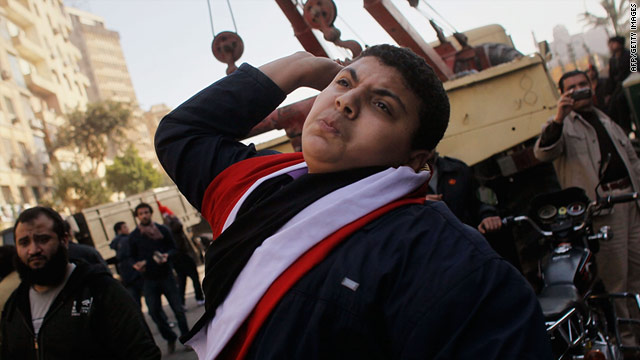Cairo, Egypt (CNN) -- Pandemonium reigned Wednesday in the epicenter of Cairo's demonstrations, where violent street battles unfolded between supporters and foes of embattled President Hosni Mubarak.
State-run Nile TV flashed a warning ordering people to adhere to a government-imposed curfew and clear out of Tahrir Square. But curfews in the past few days have been largely ignored and a crowd, though a less intense one, remained in the downtown plaza into the night.
Earlier, tear gas and gunshots were fired to quell confrontational crowds and in one surreal moment, demonstrators thundered through the crowds on horses and camels. At least one man was pulled off his horse and beaten.
State television said the riders were pyramid workers who were protesting the negative economic impact of the crisis.Mubarak's announcement Tuesday that he will not seek re-election had been expected to dampen the passion of Egypt's nine-day uprising.
But the opposite rang true, at least in central Cairo's Tahrir Square, where a mob-rule mentality was in sharp contrast to the jubilant mood of tens of thousands of anti-Mubarak protesters the day before.
It remained unclear whether such confrontations were repeated elsewhere. Contesting rallies in Egypt's second-largest city, Alexandria, were largely peaceful. Other Cairo neighborhoods also remained calm.
Events in Egypt "have moved enormously quickly in a very volatile region of the world, the likes of which we have not seen in our lifetime," White House Press Secretary Robert Gibbs noted Wednesday."What we're watching," he said, "is history being made."
The sound of gunfire reverberated in Tahrir Square, which means "liberation" in Arabic. People hurled verbal insults, Molotov cocktails, rocks and anything else they could find -- shards of metal, sticks, shoes -- at one another. Desperate for more ammunition, they dismantled sidewalks and picked up chunks of cement to throw. They beat each other in what rapidly spiraled into utter mayhem.
Through the course of the afternoon, pro-Mubarak supporters added to their ranks and eventually overturned a military vehicle to surge forward past the Egyptian National Museum toward the center of Tahrir Square. Flames shot out from the awnings and doorways of several burning buildings and thick black smoke filled the air.
Some people expressed fears to journalists that a bloodbath would ensue.
Scores of people have already been wounded. Blood streaming down their faces, they were carried away from the square into a nearby makeshift clinic.Egypt's health minister said 611 people were injured, Nile TV reported. Many suffered head injuries. Ministry spokesman Abdel Rahman Shaheen also reported the death of a security forces member in an incident at a nearby bridge over the Nile River.
Protesters climbed atop army tanks, waving flags and chanting loudly.Each side in the chilling street battle fought to lay claim to this patch of central Cairo territory that has all along been the symbol of the uprising. But despite the extremely volatile altercations, the police were nowhere to be seen and the army did little to restore order.
Mubarak deployed the army Friday after police forces -- who don't have a clean track record with the Egyptian people -- used excessive force on protesters. The army said it would not attack peaceful demonstrations, but Wednesday morning, it urged a return to normalcy.
"Your message is received ... (your) demands became known," a Defense Ministry spokesman said on Nile TV. "And we are here and awake to protect the country for you ... not by power but by the love to Egypt. It is time to go back to normal life."
But the situation in Tahrir Square raised the issue of how long soldiers would stand by passively."The army seems now to be reneging on its commitment to protect peaceful protesters," said Hassiba Hadj Sahraoui, deputy director for the Middle East and North Africa at Amnesty International. "The fact that such violence is allowed to continue as the army stands there begs the question whether they have orders not to interfere."
Egyptian Finance Minister Samir Radwan said the army has made its mission clear: It will not harm its own people. He said the government was urging opposition leaders to begin dialogue.
"I don't care who's responsible," Radwan said of the ongoing chaos. "But I think any wise person should come to the table. This is not a blaming game. I am trying to save my country."
Nile TV sought to portray the unrest as a "foreign conspiracy" fueled by international journalists.Despite reports that shots had been fired, the television network's reporters denied any shooting had taken place and even that violence had broken out in Tahrir Square. It also said that members of the opposition Muslim Brotherhood were heading to the square "to throw balls of fire and to start acts of riots and violence."
CNN journalists could not corroborate such reports. Mubarak has in the past blamed the outlawed but tolerated Islamist umbrella organization for inciting revolt.
Foreign Ministry spokesman Hossam Zaki said the Cairo clashes represented "the very raw and high emotions" of the Egyptian people, and "what is required now is for people to calm down. I don't agree that the Egyptian government has lost control," he said, adding that the international community should not interfere in Egypt's internal affairs.
The dramatic and potentially deadly situation Wednesday erupted after pro-Mubarak demonstrators broke through a barricade separating them from anti-government protesters who have been amassing for more than a week in the downtown plaza.
The whole world was watching the crisis engulfing the Arab world's most populous nation, often a barometer for regional sentiment and action. In Washington, the Obama administration renewed its call for calm Wednesday.
"We continue to watch the events very closely, and it underscores that the transition needs to begin now," Gibbs said from the White House, adding that there needs to be "real change" in Egypt.
United Nations Secretary-General Ban Ki-moon echoed those sentiments after a meeting in London with British Prime Minister David Cameron.

No comments:
Post a Comment